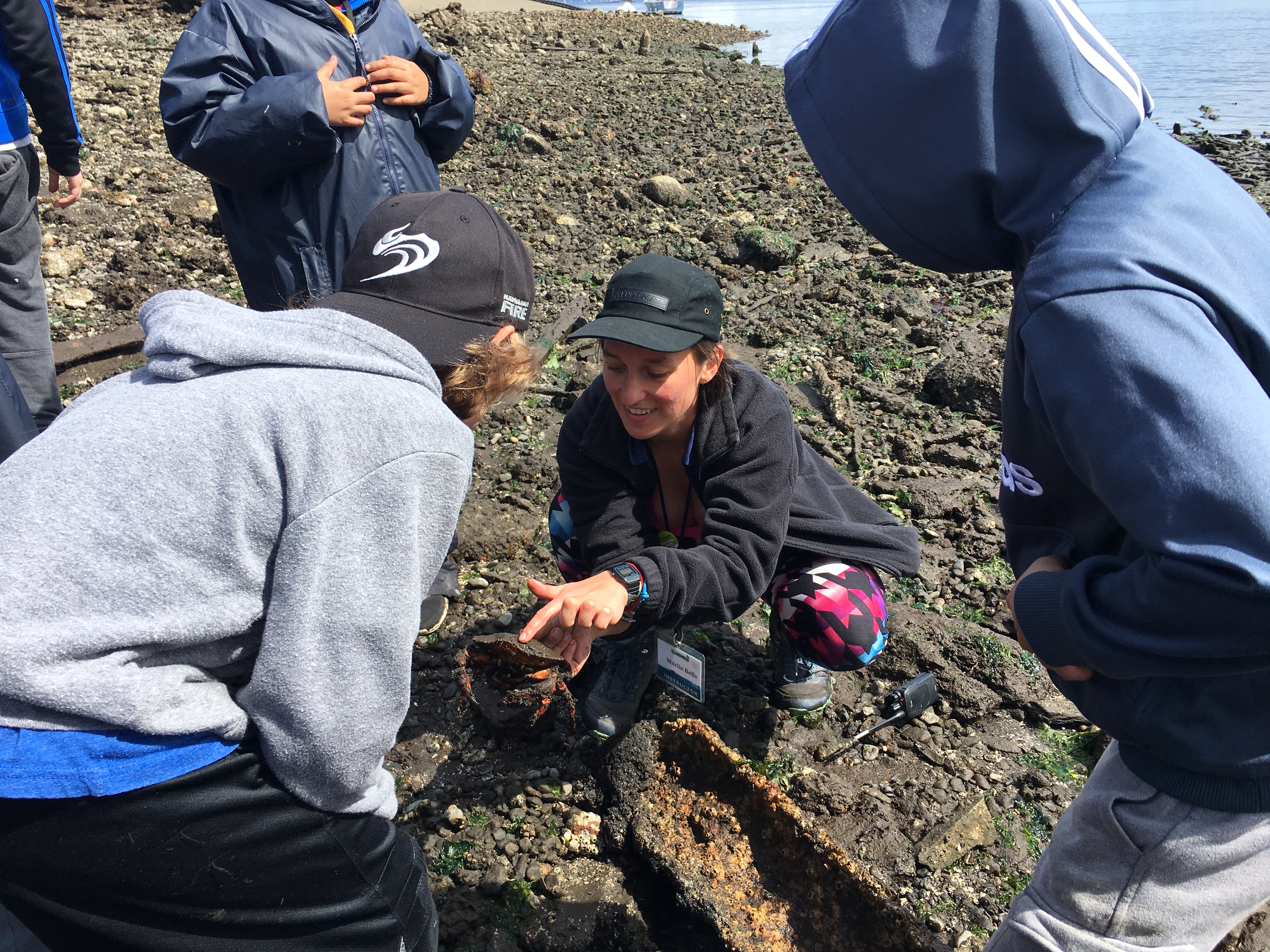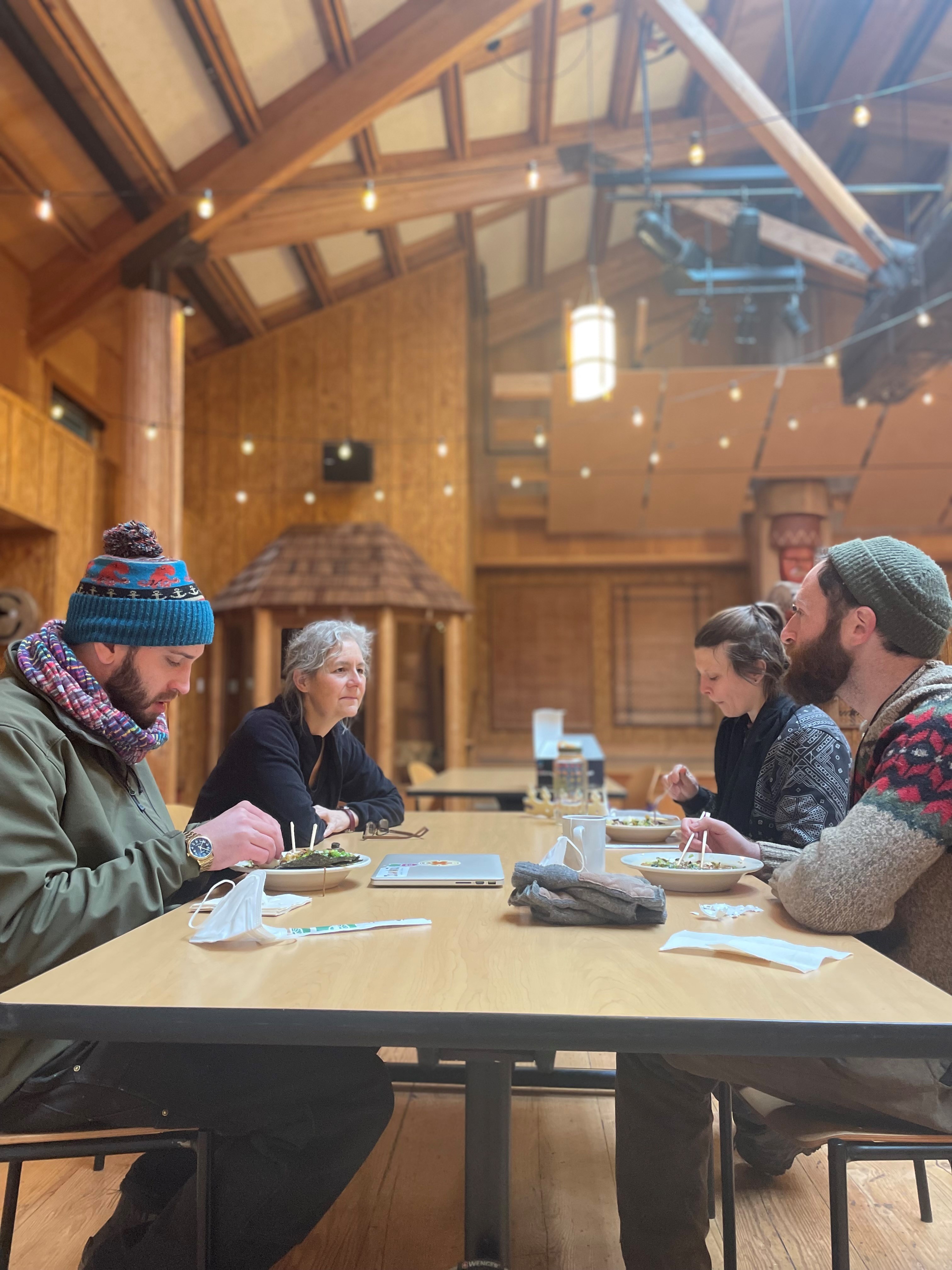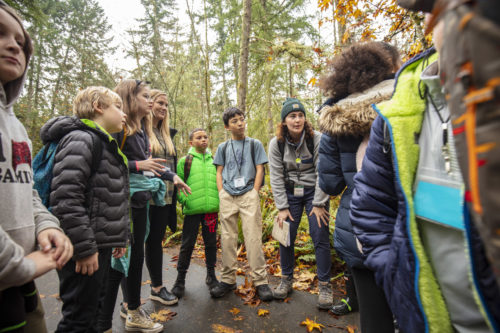We’re thrilled to share a new initiative that we have recently formalized,
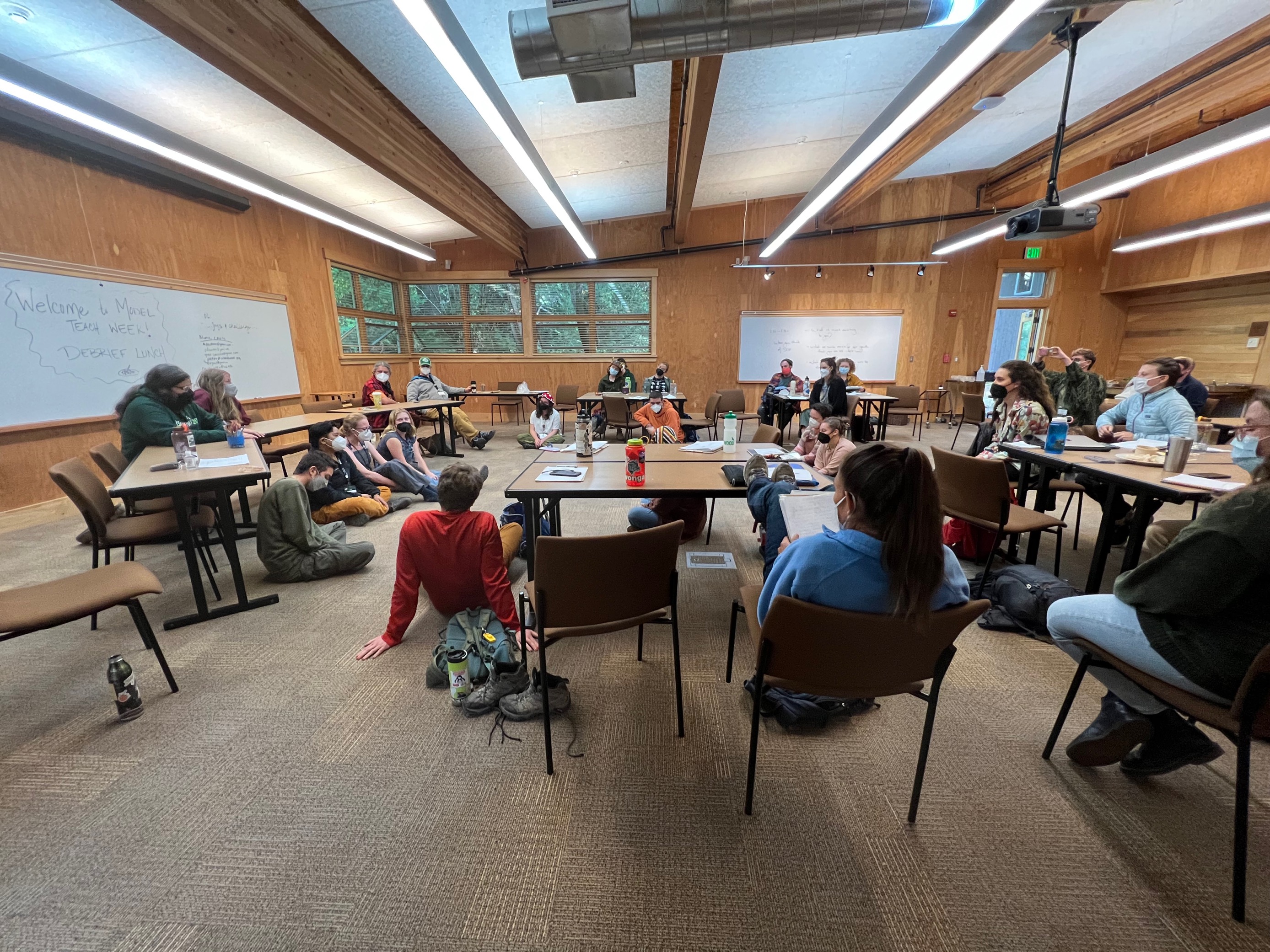
IslandWood graduate students gather in a classroom on our Bainbridge Island classroom with staff & instructors.
This spring, we added a new course to our graduate program course options called Democracy & Education. Read the Q&A below with instructor, Michela Dimond, to learn more about the course and what inspired its addition to our offerings.
At a birds-eye view, what is the course about?
This course is about answering the question “What is Democratic education, and what is my (our) role in that?” We are exploring democracy as a form of governance orientated towards justice, and what kind of education is necessary to develop citizens’ capacity to govern for the common good – i.e. our civic capacity in a democracy. Note that I am defining citizens as governing members of society rather than a legalistic definition based on what country your passport is from. To do this, we start by interrogating our own understandings of what specific, related words mean – words like politics and power. From there we introduce & build out new new definitions that better reflect a belief in the capacity of all people to govern together amongst diverse interests for the common good.
Why did we feel it would be a good addition to our grad program?
It built off the ‘surfacing your why’ work that I did with grads during orientation for a start. So it was about deepening their capacity to govern effectively within their (graduate) community and future institutions. But it’s also the kind of education that I think should be foundational for all educators in a democracy.
If we are concerned with the pursuit of justice (which is our obligation as democratic citizens), how do we best pursue that in our role as educators? What is the education necessary to develop our collective capacity to pursue justice, or the common good?
With the focus on justice in our program we don’t just want our grads to misappropriate that word — because it’s a powerful word, and they have a felt sense of that power. It’s our obligation as a program committed to justice to help develop our students’ capacity to pursue it effectively, which is also the focus of democratic education.
Much of the exploration of those questions involves an unlearning of narratives about power that are binary or polarizing, zero-sum, or breed a sense of powerlessness or hopelessness. In a democracy we are obligated to govern for the common good in all the systems and institutions in which we have a stake, and that sense (and the skills that come with it) is being lost. I’m concerned with the rise of authoritarian mindsets and the lack of investment in democracy that we see on the rise in this country, and in many places around the world right now, along with our inability to effectively govern and collectively address systemic problems – including (but certainly not limited to) global climate change & ecocide, racial apartheid & inequity, and socioeconomic stratification and segregation. This ineffectiveness and disinvestment from the most effective governing strategies we know should be a central concern of all educators concerned with justice. We see these problems out in the world – how are we going to develop our own effectiveness and that of our students to do something meaningful about it?
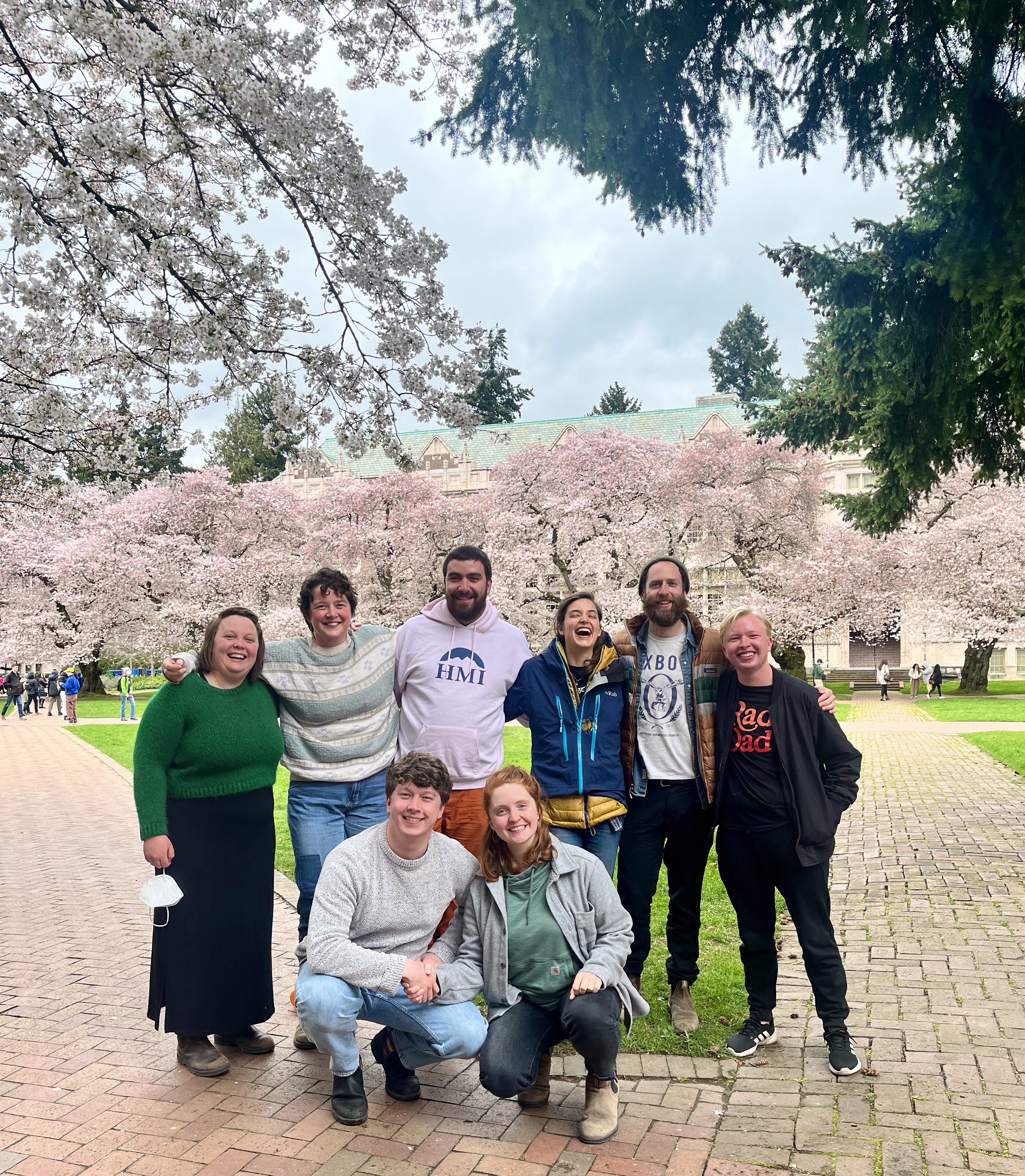
Michela is seen on the far left with some of the grads taking the Democracy & Education class held on the UW campus this spring.
What inspired you to teach this course?
I touched on this a bit above, but this is also the lifework of my mother and what I’ve been raised in my whole life. My mother Peg Michels is a co-designer of the Civic Organizing Framework, alongside Tony Massengale. They took what they knew from Industrial Areas Foundation style organizing, political campaigns, and their own experiences within systems to develop a theory of organizing that is specifically oriented towards developing our collective capacity to effectively govern for the common good. I co-designed a lot of this course with her input and organizing structures. You can find out more about her work here!
What do you hope that grads will get out of it?
My hope is that grads will start to shift their ideas about what it means to pursue justice, and what democracy means in the context of their vocation as educators. My hope is that grads will start to think about their role and their obligation to pursue justice in the tension of diverse interests. I hope that they come into this work with some clarity and a whole lot of questions to set themselves up on life’s work of pursuing justice in relationship with others committed to that project. I hope that they challenge an imagination of Democracy defined as “one person one vote,” or as “having voice,” but instead also think about what our responsibilities are to each other as governing members of society.
Can you share some of the texts that grads read for this course?
The core text for our course was Dorothy Cotton’s autobiography If Your Back’s Not Bent. Cotton lead the Citizenship Education Program under SCLC (the Southern Christian Leadership Conference), Dr. King’s organization during the Civil Rights Movement. Cotton’s work alongside Septima Clark, Andrew Young, and other leaders in the development of a liberation oriented civic education, offers a radical reimagining of what our role in a democracy should be, and a powerful lesson in what a justice-oriented education could, and should, look like if we are interested in building a multi-racial democracy in this country.
I was also deeply concerned with working with political theory in this course, as we often separate justice from politics in education, when in fact they are necessarily intertwined. We dug into work by political theorists like Wendy Brown, Chantal Mouffe, Melvin Rogers, Amy Gutmann, Alexis de Tocqueville, Angela Davis, and Danielle Allen.
Our course was also structured around connecting these theories to practice and looking at case studies of education in practice. The course was structured around exploring the foundational tensions of democracy – like the tension between equality & freedom, unity & diversity, and conscience & law. Exploring the practice of justice in these tensions, through exploring political and educational theory and applying that exploration to case studies was the overall structure of our experiment oriented towards answering our course purpose – “What is Democratic Education and what is my (our) role in that?”
Anything else you’d like to share?
I was blown away by the level of engagement and thinking the grads brought to this course. Every week we really DUG into the ideas and tensions that were our theme. I feel energized by the work we did in building this experiment together and see a lot of possibilities if we stay dedicated to continuing this work beyond this quarter!
—
Learn more about IslandWood’s Graduate program in partnership with the University of Washington here.
If you haven’t already, subscribe to our newsletter to stay in the know about blog posts, news, and events!

